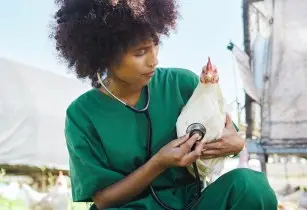According to a recent South African Veterinary Association report, economic and safety concerns have influenced the decision of more than 50% of the country’s young veterinarians to leave
A fully staffed veterinary service is a critical enabler to a thriving agriculture sector in the province. The Western Cape Minister of Agriculture, Ivan Meyer, is however concerned that South Africa is not producing enough veterinarians to meet the country's needs.
“The international norm is between 200 and 400 veterinarians per million of the population – yet currently, there are about 60 to 70 veterinarians per million in South Africa. This represents about 25% of our country's needs. So this is a crisis," said Meyer. He further pointed out that the aggravation of the shortage was a result of the country removing veterinarians from the critical skills list, making it harder for international veterinarians to acquire a work visa.
"The shortage of veterinarians puts South Africa's economic prospects and animal and human health at risk", continued Meyer, stressing that avenues such as Occupational Specific Dispensation (OSD) needed to be explored, to create an enabling environment through employment remuneration conditions, thereby stopping and reversing the trend of young veterinarians emigrating. In addition, Meyer also suggested improving young veterinarians' working environment and career prospects to improve the retention of a critical skill required within the agricultural economy.
Meyer has announced that he will soon be writing to the national Minister of Agriculture, Land Reform and Rural Development seeking urgent intervention. He strongly believes that South Africa needs a second veterinary training centre, comprising of a commissioned faculty capable of training a large number of veterinarians.
Coastal provinces such as Western Cape, Eastern Cape and KZN are believed to be ideal sites to host a second veterinary faculty. These provinces carry more than half of the country's animal population that could be better serviced and benefit from the research platform created by the new faculty. Moreover, through this initiative, veterinarian work on aquaculture and marine culture is also expected to receive a massive boost.





